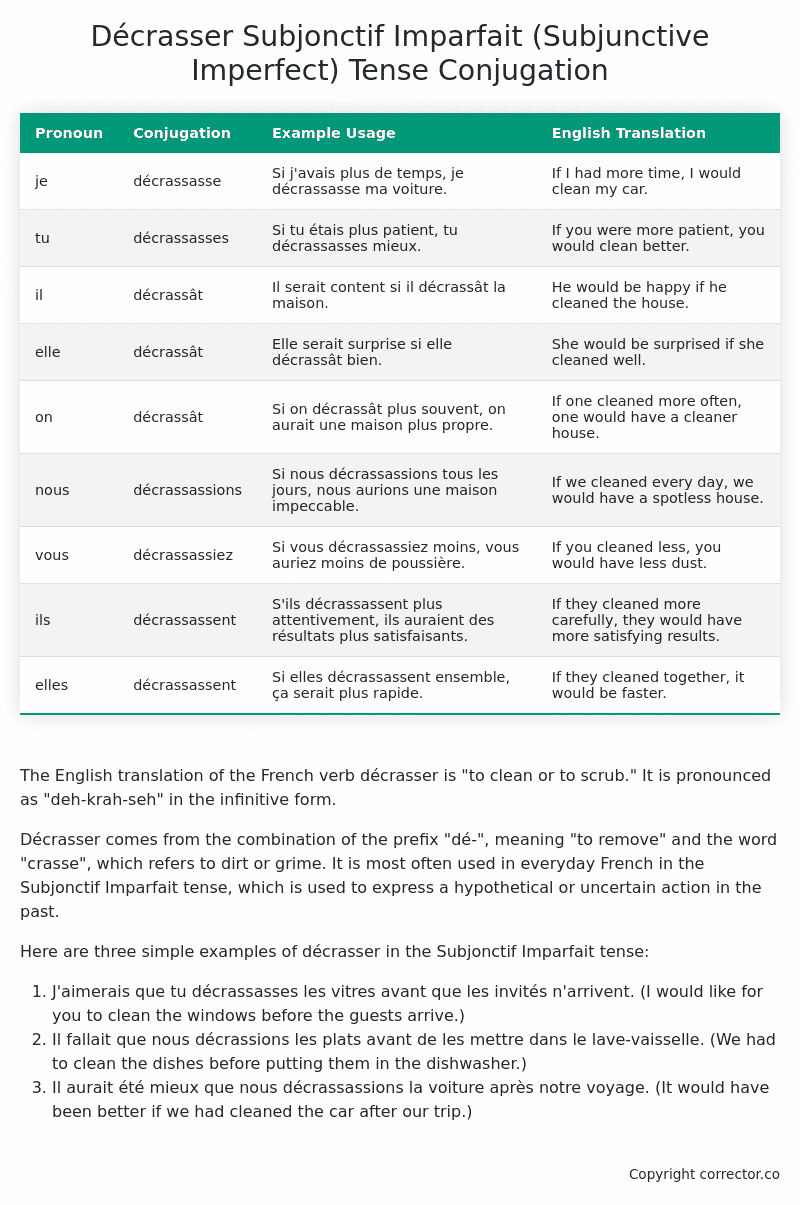Subjonctif Imparfait (Subjunctive Imperfect) Tense Conjugation of the French Verb décrasser
Introduction to the verb décrasser
The English translation of the French verb décrasser is “to clean or to scrub.” It is pronounced as “deh-krah-seh” in the infinitive form.
Décrasser comes from the combination of the prefix “dé-“, meaning “to remove” and the word “crasse”, which refers to dirt or grime. It is most often used in everyday French in the Subjonctif Imparfait tense, which is used to express a hypothetical or uncertain action in the past.
Here are three simple examples of décrasser in the Subjonctif Imparfait tense:
- J’aimerais que tu décrassasses les vitres avant que les invités n’arrivent. (I would like for you to clean the windows before the guests arrive.)
- Il fallait que nous décrassions les plats avant de les mettre dans le lave-vaisselle. (We had to clean the dishes before putting them in the dishwasher.)
- Il aurait été mieux que nous décrassassions la voiture après notre voyage. (It would have been better if we had cleaned the car after our trip.)
Table of the Subjonctif Imparfait (Subjunctive Imperfect) Tense Conjugation of décrasser
| Pronoun | Conjugation | Example Usage | English Translation |
|---|---|---|---|
| je | décrassasse | Si j’avais plus de temps, je décrassasse ma voiture. | If I had more time, I would clean my car. |
| tu | décrassasses | Si tu étais plus patient, tu décrassasses mieux. | If you were more patient, you would clean better. |
| il | décrassât | Il serait content si il décrassât la maison. | He would be happy if he cleaned the house. |
| elle | décrassât | Elle serait surprise si elle décrassât bien. | She would be surprised if she cleaned well. |
| on | décrassât | Si on décrassât plus souvent, on aurait une maison plus propre. | If one cleaned more often, one would have a cleaner house. |
| nous | décrassassions | Si nous décrassassions tous les jours, nous aurions une maison impeccable. | If we cleaned every day, we would have a spotless house. |
| vous | décrassassiez | Si vous décrassassiez moins, vous auriez moins de poussière. | If you cleaned less, you would have less dust. |
| ils | décrassassent | S’ils décrassassent plus attentivement, ils auraient des résultats plus satisfaisants. | If they cleaned more carefully, they would have more satisfying results. |
| elles | décrassassent | Si elles décrassassent ensemble, ça serait plus rapide. | If they cleaned together, it would be faster. |
Other Conjugations for Décrasser.
Le Present (Present Tense) Conjugation of the French Verb décrasser
Imparfait (Imperfect) Tense Conjugation of the French Verb décrasser
Passé Simple (Simple Past) Tense Conjugation of the French Verb décrasser
Passé Composé (Present Perfect) Tense Conjugation of the French Verb décrasser
Futur Simple (Simple Future) Tense Conjugation of the French Verb décrasser
Futur Proche (Near Future) Tense Conjugation of the French Verb décrasser
Plus-que-parfait (Pluperfect) Tense Conjugation of the French Verb décrasser
Passé Antérieur (Past Anterior) Tense Conjugation of the French Verb décrasser
Futur Antérieur (Future Anterior) Tense Conjugation of the French Verb décrasser
Subjonctif Présent (Subjunctive Present) Tense Conjugation of the French Verb décrasser
Subjonctif Passé (Subjunctive Past) Tense Conjugation of the French Verb décrasser
Subjonctif Imparfait (Subjunctive Imperfect) Tense Conjugation of the French Verb décrasser (this article)
Subjonctif Plus-que-parfait (Subjunctive Pluperfect) Tense Conjugation of the French Verb décrasser
Conditionnel Présent (Conditional Present) Tense Conjugation of the French Verb décrasser
Conditionnel Passé (Conditional Past) Tense Conjugation of the French Verb décrasser
L’impératif Présent (Imperative Present) Tense Conjugation of the French Verb décrasser
L’infinitif Présent (Infinitive Present) Tense Conjugation of the French Verb décrasser
Struggling with French verbs or the language in general? Why not use our free French Grammar Checker – no registration required!
Get a FREE Download Study Sheet of this Conjugation 🔥
Simply right click the image below, click “save image” and get your free reference for the décrasser Subjonctif Imparfait tense conjugation!

Décrasser – About the French Subjonctif Imparfait (Subjunctive Imperfect) Tense
Formation
Common Everyday Usage Patterns
Interactions with Other Tenses
Subjonctif Présent
Indicatif Passé Composé
Conditional
Conditional Perfect
Summary
I hope you enjoyed this article on the verb décrasser. Still in a learning mood? Check out another TOTALLY random French verb conjugation!


